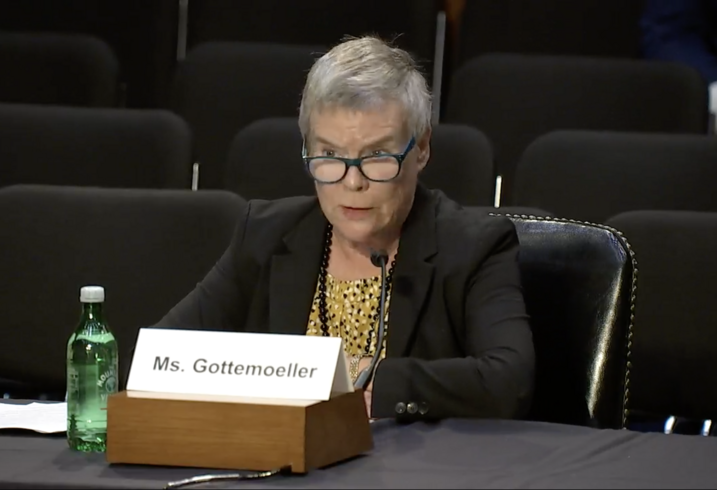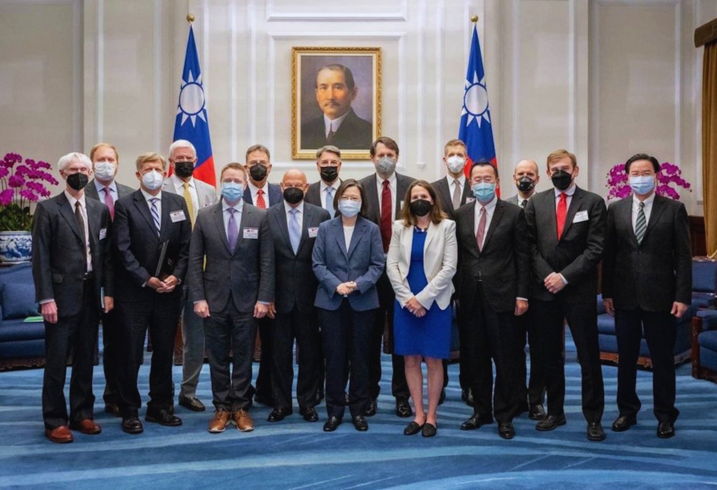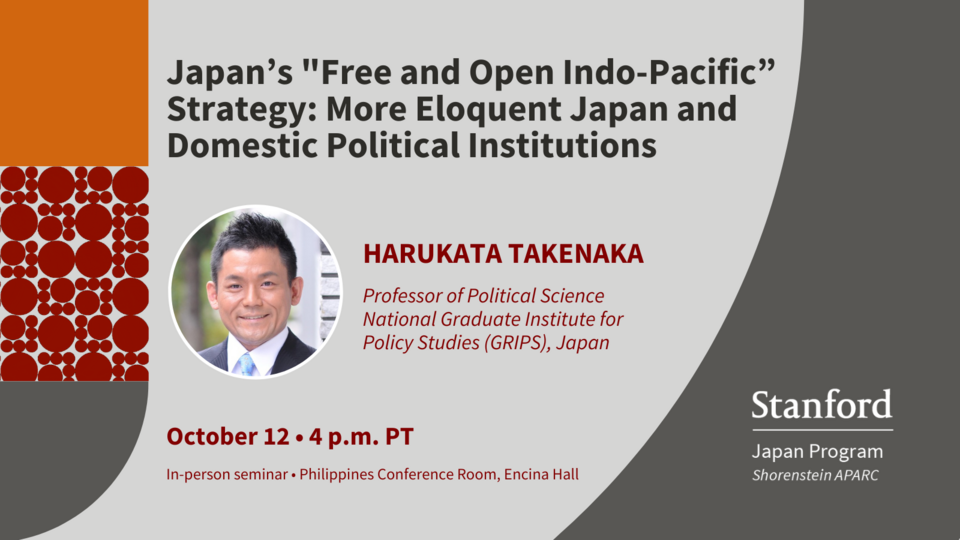Policy Impact Spotlight: Rose Gottemoeller and Negotiations for a Safer World
For many people, nuclear weapons feel like something out of a history book rather than a news headline, a remnant left over from the era of go-go boots and rotary phones rather than the age of social media and quantum computing.
But Vladimir Putin’s veiled threats of a possible tactical strike against Ukraine are a stark reminder that nuclear weapons are still a major factor in strategic defense and deterrence policies.
In a geopolitical landscape like this, the perspective of scholars like Rose Gottemoeller, formerly the Deputy Secretary General of NATO and currently the Steven C. Házy Lecturer at the Center for International Security and Cooperation (CISAC) at Stanford University’s Freeman Spogli Institute for International Studies, is more important than ever.
Currently, she is acting as an advisor to the Strategic Posture Commission of the House and Senate Armed Services Committee and to the Department of Energy’s National Nuclear Strategy Administration (NNSA), but this is far from the first time she has been called on from Capitol Hill or the executive branch.
From her start as a Russian language major at Georgetown University, Gottemoeller’s expertise in arms control, nuclear nonproliferation, and political-military affairs has made her an invaluable resource to fellow academics and policymakers alike as they work to tackle the nuanced diplomatic challenges of our times.
A Missed Phone Call and a New Career
Gottemoeller’s most recent government service came with a few hiccups. In December of 2008, she was living in a small, bare-bones rental unit in Moscow while she finished the last few weeks of her tenure as the director of the Carnegie Moscow Center. Just a few weeks earlier, Barack Obama had been elected to the presidency of the United States, and the interim period of administration-building between Election Day and Inauguration Day was fully under way.
5,000 miles away from Washington D.C., Gottemoeller’s American cell phone rang. Racing across the apartment to try and answer it, the call ended before she could answer. Due to technological constraints at the time, there was no way to listen back to the voicemail on the Russian network.
Recounting the experience on “The Negotiators” podcast, Gottemoeller explained, “All I was thinking was, ‘Oh man, what is that, was the White House calling, or the Obama campaign? What if I’ve just lost my chance?’”
As soon as she landed back at the Washington Dulles airport, she got her answer. A return call to the number put her in touch with Secretary of State-designate Hillary Clinton’s office, where an offer to discuss the position of assistant secretary responsible for arms control issues was still on the table.
![Rose Gottemoeller [left] stands with Hillary Clinton [right] in the Treaty Room at the U.S. Department of State in Washington D.C.](https://fsi9-prod.s3.us-west-1.amazonaws.com/s3fs-public/styles/680x378/public/2022-12/gottemoeller_clinton_state_department_policy_flikr_hero.png?itok=nhZBZm70)
“Before I had even collected my luggage, I was on the phone letting them know I would be very glad to come interview with her,” said Gottemoeller.
That initial interview was nerve-wracking, to say the least. Walking into a borrowed New York apartment above Central Park where Clinton had set up her temporary office, Gottemoeller was grilled on nuclear deterrence, U.S. strategic policies, and strategic arms reductions by the future secretary and her two deputies for several hours.
“I thought it was going terribly. It was an exhausting hour and a half,” admits Gottemoeller. “I was convinced I hadn’t done very well.”
But a call the next day proved otherwise. Not only did Secretary Clinton offer her the job of assistant secretary responsible for arms control matters, but also put Gottemoeller’s name forward to the incoming White House to be the chief negotiator for the next strategic arms reduction treaty, what would eventually become the New START Treaty.
The New START Treaty, Then and Now
Formalized in 2010, the New Strategic Arms Reduction Treaty, or New START, builds on prior agreements put in place between the United State and Russia through the 1970s and 80s to actively reduce and limit the number of strategic nuclear weapons.
As the lead (and first female) negotiator of the treaty for the U.S. side, Gottemoeller knows its strengths and holes better than almost anyone. Building on the progress made by the START I Treaty in 1994, the New START Treaty has successfully reduced the number of deployed strategic nuclear weapons in Russia to 1,550, a 30 percent reduction from the approximately 6,000 deployed warheads that existed in 2000, and an astonishing 87 percent reduction from the estimated 12,000 deployed nuclear warheads available to the USSR and United States at the end of the Cold War.

New START continues to limit the number of strategic nuclear warheads that Russia and the United States are permitted to deploy, and it sets extensive protocols for monitoring and controlling such warheads in both countries. However, it has proven much more difficult to count and verify Russian warheads once they have been removed from their delivery vehicles and sent into storage.
“One of the major developments moving forward needs to be this more direct kind of constraint and oversight of warheads,” says Gottemoeller. “We’ve made some baby steps in that direction, but there’s certainly more we could and should be pushing for.”
Similarly, while New START has clear protocols for managing strategic nuclear warheads, there are gaps in constraining Russia’s stockpile of non-strategic nuclear warheads. Strategic nuclear weapons, as defined by NATO, constitute “weapons to whose use or threat of use only the highest authority of the State can resort, conceptually and structurally.” In the popular imagination, these are the weapons of M.A.D, or “mutually assured destruction,” which rests on the idea that the United States and Russian hold each other at constant risk of nuclear annihilation. A legitimate strategic calculation, this also serves as the basis for the "nuclear Armageddon" trope of Hollywood.
By contrast, non-strategic nuclear weapons, also referred to as “tactical nuclear weapons,” often carry smaller explosive yields, are carried on shorter-range delivery vehicles, and are designed to be used on the battlefield in combination with conventional forces. It is this type of weapon — not strategic missiles — which has caused concerns in the course of Putin’s invasion and ongoing bombardment of Ukraine.
The Invasion of Ukraine and Nuclear Sabre-rattling
Gottemoeller is clear on the repercussions that Vladimir Putin’s veiled threats of a possible tactical nuclear strike against Ukraine are having.
“Putin and his coterie have been extremely irresponsible in their rattling of the nuclear sabre,” she says. “There's absolutely no reason to be threatening nuclear use in Ukraine. This is a war of choice and invasion that Putin decided to undertake, not something he was provoked into by Ukraine, or NATO, or anyone else for that matter.”
Having watched and worked in Putin’s orbit on-and-off for decades, Gottemoeller believes that Putin and those in his inner circle understand that a strategic nuclear exchange of any kind would be “suicide.” But the escalatory risks inherent in a single tactical nuclear strike are still high.
“Threatening nuclear use, even if it’s a single, non-strategic use, is playing with fire,” warns Gottemoeller. “It’s dangerous. There is still far too much potential for escalation in that scenario.”
Intended or not, Putin’s nuclear posturing has also brought the discussion of nuclear weapons and the policies governing their use back to the forefront for people both in and out of government.
“In some ways, that’s not a bad thing,” Gottemoeller acknowledges. “Younger people in particular don’t pay as much attention to nuclear weapons. They’re much more gripped by environmental threats and the threat of climate change.”
The two existential threats are not unrelated, however. Citing an MIT study, Gottemoeller points out that a nuclear exchange would have a profound effect on the climate, potentially even leading to an extinction event for large portions of the global population.
“The notion that we could see nuclear escalation in this war in Ukraine is very, very serious,” says Gottemoeller. “It’s brought these issues into much sharper focus than it has been since the Cold War.”
Developing Nuclear Policies for the Future
Meaningful nuclear policy has often been born out of such moments of sharp focus. The first major treaty, the Treaty on the Non-Proliferation of Nuclear Weapons (NPT), first came into force in 1970 following the Cuban Missile Crisis in 1962. The treaty created the first binding commitments toward the goal of disarmament for the nuclear powers at the time — the United States, USSR, and United Kingdom — as well as setting policies of nonproliferation for an additional 46 party states. To date, a total of 191 states have joined and upheld the treaty, including the five current nuclear-weapon states of the United States, Russia, the United Kingdom, France, and China.
The work that Rose Gottemoeller is currently undertaking as an advisor to the Strategic Posture Commission and National Nuclear Strategy Administration aims to provide the necessary legwork and critical expertise needed to prepare policymakers for high-level negotiations on future nuclear treaties. New START, currently the last remaining nuclear arms agreement between the United States and Russia, will expire in 2026, and cannot be renewed again without re-ratification by the U.S. Senate. Given the uncertainty surrounding the Kremlin’s actions regarding tactical nuclear weapon use, the importance of providing this type of in-depth policy expertise cannot be understated.
At the Strategic Posture Commision, Gottemoeller is working alongside other experts on a committee chaired by Madelyn Creedon, an expert in national security and defense and former assistant secretary of defense for global strategic affairs at the Pentagon. Working under bi-partisan leadership from both the House and Senate, this commission is in the process of evaluating the long-term strategic posture of the United States. This includes nuclear weapons, but also conventional weapons, trade agreements, economic progress, arms control diplomacy, and other capabilities of United States national power.
In this realm, Gottemoeller stresses that while nuclear weapons will never cease to be important, new defense strategies need to be focused on emerging technologies rather than the nuclear standoffs of the past. Writing in the August 2022 edition of Foreign Affairs, she stresses that:
“New defense innovations promise not just to transform warfare but also to undermine the logic and utility of nuclear weapons. With advances in sensing technology, states may soon be able to track and target their adversaries’ nuclear missiles, making the weapons easier to eliminate. And with nuclear weapons more vulnerable, innovations such as drone swarms — large numbers of small automated weapons that collectively execute a coordinated attack—will increasingly define war. A fixation on building more nuclear weapons will only distract from this technological revolution, making it harder for the United States to master the advances that will shape the battlefield of the future.”
At the National Nuclear Security Administration, Gottemoeller is similarly applying her expertise to develop better policies to monitor the nuclear warheads already in existence. Launched by Jill Hruby and Frank Rose, the leaders of NNSA, the purpose of this review is to determine how to improve the nonproliferation tools and instruments, one of the Biden administration’s key missions. Working alongside partners at the National Nuclear Laboratories, the NNSA is developing innovative ways to monitor and verify constraints on warheads and their delivery vehicles, including exotic delivery vehicles such as the Russian hypersonic Kinzhal air-launched ballistic missile.
“I do really see that there has been a lot of progress in this area and I feel like we are well prepared for a new negotiation,” says Gottemoeller.





The Power of Academia for the Good of Government
Thinking about her own dual career in government and academia, Gottemoeller is quick to point out the immense value that collaboration between the two brings to the policymaking process.
“Over the years, Stanford has been very active in these kinds of discussions and it's been extremely valuable, I think. The academic community plays a super important role for the policy community in Washington,” she says.
In her own recent experience, that has included a meeting with Secretary of State Antony Blinken, alongside fellow nuclear expert Scott Sagan, also of FSI’s Center for International Security and Cooperation (CISAC).
Gottemoeller points out that sometimes academics and their institutions can go where governments can’t. These so-called “track-two” settings create opportunities for experts, academics, and professionals from various states to come together for discussion and discourse even if formal “track-one” government negotiations are stalled or stagnant. Even as the war in Ukraine has intensified the divide between the governments in Washington and Moscow, non-governmental experts from the U.S. and Russia continue to meet to ensure lines of communication and understanding regarding key issues remain open.
Gottemoeller believes institutes like FSI and other academic organizations can play a similarly important role in advancing discussion with China, particularly in the realm of nuclear security and weapons modernization. Some of these discussions, such as collaborations between the U.S. National Academy of Sciences and the Chinese Scientists Group on Arms control (of which Gottemoeller is a participating member), are already underway.
“I think dialogues like this are a way in which the academic community can help develop an environment in which the Chinese will then eventually be willing to come to the table in an official government-to-government way,” she explains.
As for her own academic home at the Freeman Spogli Institute, Gottemoeller is grateful for the work the institute and her fellow scholars allow her to do.
“Organizations like FSI and CISAC are a great home for practitioners as well as academic experts. The Freeman Spogli Institute attracts very senior figures with immense amounts of policy experience to come and work here. It’s clearly a resource for the government back in Washington, and I think these groups will continue to play that role very well for a long time.”
Read More
From a missed phone call in Moscow to becoming the lead U.S. negotiator of the New START Treaty, scholars like Rose Gottemoeller demonstrate the importance of collaboration between scholars in academic institutions and policymakers in government.






































